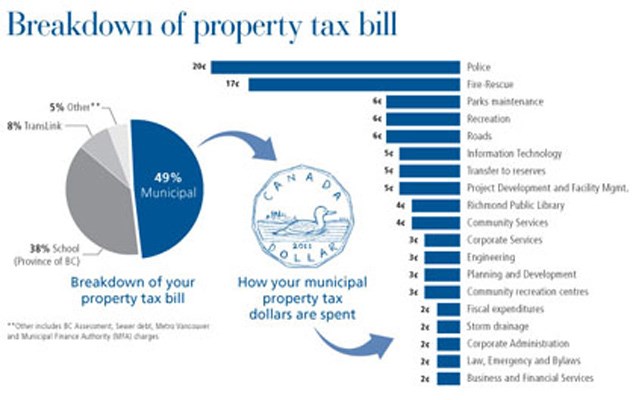It's a rare day that you'll hear someone say they're off to Ottawa to make sure our MPs, Alice Wong and Kerry-Lynne Findlay, are doing their job properly in parliament.
And it's just as unlikely for a neighbour to nudge you with the news that they're heading for a ferry to Victoria to cast a critical eye over the work of Richmond's MLAs in the legislature.
So why is it then that the only level of government - where Joe Public can actually engage with elected officials on an almost daily basis and physically watch over them at meetings - can't buy a friend among an apathetic electorate when it comes to election time?
A record low voter turnout of just 22.11 per cent in 2008, down from 25.72 in 2005, is startling considering the vast array of municipal services that people's property tax dollars pay for - services that elected councillors can have a hand in.
As the graph shows, of the 49 per cent of the tax dollar the city receives, a large chunk - 37 cents goes to police and fire-rescue.
However, the remaining 63 cents gets plowed into parks and recreation, roads, libraries, community services, engineering, planning and development, community recreation centres, storm drainage and bylaws - services that most people come into contact with every single day.
Stung by the paltry turnout three years ago, the City of Richmond has gone out of its way this time around to make it as easy as possible for citizens to make their mark, offering up a whole host of voting opportunities and locations across the city.
But have the city and, more importantly, the candidates done enough to tempt people back to the polls this Saturday?
Richmond's former mayor, MLA and soon-to-be ex-councillor, Greg Halsey-Brandt, who is stepping down this time due to his disillusionment with council, has praise for at least one of the parties.
"I think the efforts made by the city, in terms of the campaign guide, the increased advance voting opportunities and locations on Election Day, deserves a lot of credit," said Halsey-Brandt.
"I was at an all-candidates meeting today (Tuesday) and I heard one of the candidates say that the city should be doing more to get people out to vote. I can't think what that would be.
"However, I would have expected (the candidates) to be out there more, in the media for example. I can understand the incumbents not wanting to attract attention, they want to keep things smooth.
"But I've been disappointed in some of the challengers in terms of what they're unhappy about."
Halsey-Brandt, who's bowing out of civic politics because he got fed up with a council he said simply rubber-stamps everything staff present to them, can't put his finger on why so few people bothered to vote in the last city election.
However, he's optimistic that the tactics employed by the city this time around and a fresh injection of Asian blood among the council hopefuls will breathe new life into an ailing civic election body.
"I'm very pleased to see all the candidates with an Asian background that have come forward.
"The school board looks as though it could have a majority (of trustees of Asian background), so it will be interesting to see what happens in the council election as well."
Another theory behind 2008's embarrassing turnout is that people are being turned off by the perception that city staff are a law unto themselves in terms of spending priorities and how the tax dollar is ultimately distributed.
However, the city's corporate communications manager, Ted Townsend, said that the spending priorities are essentially laid out soon after an election when the new council sets its "council term goals."



